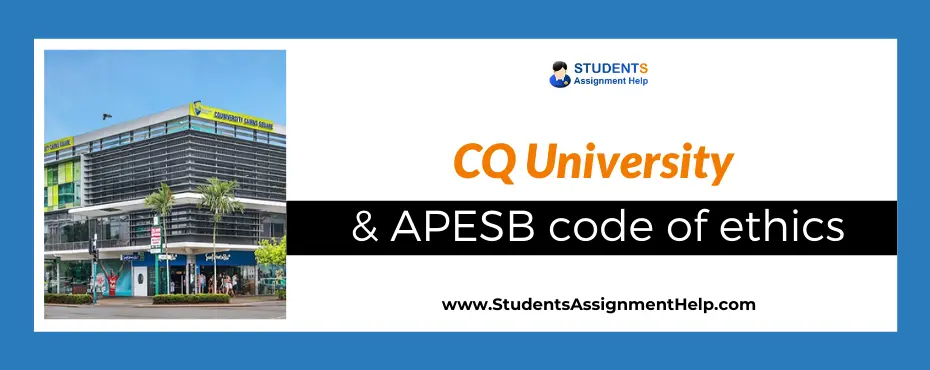CQ University & APESB code of ethics

Executive Summary
This report is mainly developed in the form of a business report which is focused to examine the code of ethics and corporate governance practices of two organizations namely the CQUniversity and APESB. In relation to the code of ethics of these organizations, the report has evaluated the identification of the stakeholder groups which are affected by these documents and the business ethics issues that the documents of these two organizations address.
Further the report has presented a response to the mandatory requirements and aspects that represent voluntary practices. Further, the report has illustrated the reflection of the corporate governance aspects covered in these policy documents of the two organizations. In addition to this, the report has also covered transparency maintained in the two documents of the related institutions. Overall, this report is a significant piece of information for the two institutions to have a clear idea about current status quo of their corporate governance practices and significance of the code of ethics principles and practices to secure interests of stakeholders and other related issues.
Flexible Rates Compatible With Everyone’s Budget
Hire a Professional Essay & Assignment Writer for completing your Academic Assessments
Introduction
Ethics can be considered as the perspectives which reflect some right or wrong practices. For a business organization, there is a need of following some crucial ethics and positive practices in favor of the different stakeholders of the organization (Plessis and Bagaric, 2010). In regard to this, for the purpose of aligning different organizational practices with specific ethical practices, there is a need for different specific codes of ethics and standards set by different authorities (Vilcox and Mohan, 2007).
In relation to this, the presented report aims to evaluate the code of ethics for two different organizations i.e. the CQ University, Australia, and Code of ethics for professionals. In this regard, the presented report reflects both the reports on the basis of different aspects, such as identification of the stakeholders for the code of ethics for both the reports; identification of the aspects in two documents which response or represent mandatory requirements, as well as, voluntary practices. In addition to this the report also highlights the current status of corporate governance and transparency at both of these institutions.
Stakeholder groups identified and emerging business ethics issues addressed by two documents
Two documents namely; the CQ University Code of Conduct, and code of ethics for Professional Accountants studied in the report have elaborated some specific practices, codes and regulations for the related stakeholders in order to achieve the objective of ethical sustainability for the organization (CQ University Australia, 2012). In this regard, both the documents explore differentiated stakeholders, as well as, different business ethics issues in order to explore ethical viability of operations of both the related organizations. In this context, the code of ethics document for CQ University has reflected that the document is drafted for specific stakeholders, which are listed below:
• Supervisors:
Supervisors appointed by the University for guiding students in their research and study work are supposed to follow ethical guidelines.
• Employees:
Employees appointed for accomplishing different operations of the university are also categorized stakeholders of the organization (CQ University Australia, 2012).
• Council Members:
Member of Councils who are at regulatory positions and are responsible for strategic direction of the university is also prime stakeholders for the code of conduct document.
Along with this, the second document illustrates three basic stakeholders for the document which are:
• Employees:
Employees appointed for the regulation of different operational activities of the organization are the prime stakeholders (APESB, 2011).
• Financial Institutions:
Different institutions such as Banks, insurance companies and pension funds are also covered by the document.
• Administrative Authorities:
Authorities and regulatory board for the organization are also important stakeholders for code of ethics.
There is several business ethics issues that are prone to both these organizations are to deal with these issues is a prime requirement for them. For instance; Code of Ethics Document for CQ University illustrates that issues related to workplace harassment, and bullying issues within the University Campus, as well as, Workplace safety and enjoyment for employees and supervisors are the prime ethical issue for the organization in present condition (CQ University Australia, 2012).
Along with this, in present conditions safe use, handling, storing and transporting the university properties and commodities by its employees is also a critical issue for which there is an intensive need of ethical decision making from the side of the university management. The document reflects differentiated ethical guidelines for taking care of the safe and enjoyable workplace.
The second document, which is designed by the Accounting Professional and Ethical Standard Boards (APESB), has illustrated that in the field of accounting, the business organizations are suffering from several issues such as financial fraud or lack of accuracy in accounting due to which legislative requirements are violated (APESB, 2011).
In recent period of time, the global financial industry has witnessed several violations of corporate governance rules and regulations which put a question mark over the viability and feasibility of these instruments. To deal with these issues, there is a need of having a specific and workable policy measure which can be proved helpful for aligning the practices of accounting professionals with ethical accounting norms. In addition to this, increasing legal requirements for making the accounting practices more ethical is also one of the major business ethics related issues reflected by the document.
Aspects which reflects the response to mandatory requirements and voluntary practices
Two documents reviewed are reflecting various aspects of ethical practices. Some of these aspects can be considered as the response to mandatory requirements, while some of them are the representations of voluntary practices. These aspects can be discussed as below:
Aspects which are response to mandatory Requirements:
The code of ethics document of the CQUniversity confirms responsibilities of supervisors, staff members and council members regarding duty of care and their role, while undertaking external activity and public comments (CQ University Australia, 2012). These practices are completely aligned with Queensland public sector ethics act 1994. As per these ethical guidelines, all the university members and stakeholders are required to respect the inherent dignity of all the students and other individuals. Moreover, in the alignment of statutory requirement of the act are the University’s members are also directed to have active participation of community of scholars.
Along with this, as per the workplace health and safety Act 1995, the university members are required to have duty to take care for a safe workplace.
In the same manner, ethical standards of APESB also presents some specific ethical practices of accounting professionals which are quite aligned with mandatory requirements imposed by the local legal authorities.
For example; the ethical document of the organizations reflects that all the accounting professionals are required to have specific transitional provisions related to public interest entities in regard to different aspects such as non-assurance services, rotation of partners in a firm, accounting fees compensation, evaluation policies, relative size of the organization (APESB, 2011). These all the ethical requirements set by APESB are aligned with different legislative instruments such as Corporation Act 2001. As per the Act, all the audits and accounting reviews undertaken by accounting professionals are needed to be accomplished under specific legal enforceability.
Aspects which represent voluntary practices:
Along with mandatory requirements, the ethical policy document for both the organizations also addresses some voluntary ethical practices for their related stakeholders. For instance; the Code of Ethics Document of CQ University states that all the university members who has specialization in different fields of education are required to have voluntary participation with community organizations in order to sustainable development of society (CQ University Australia, 2012). In addition to this, surrounding environment production and its related practices are also one of the major operational concerns of the University, which is to be accomplished by voluntary participation of university members.
In the same manner, the code of ethics document of APESB explores some voluntary practices of accountants. For example; the professional accounts are ethically bounded to have effective assurance of client which means they are needed to be in direct reporting engagement with clients for the purpose of resolving any financial issues faced by them (APESB, 2011). Along with this, assertion based engagement of professional accountants for disseminating proper and adequate knowledge of the subject to the client who are completely unknown to technical knowledge of accounting is also subjected to be a voluntary practices of accounting professional as per the ethical guideline of the organization.
Reflection of both the documents on corporate governance and transparency of the related institutions
The code of ethics documents presented by the CQ University and APESB clearly reflect different guidelines and corporate governance related regulations in order to ensure highly transparent and positive operational procedures used by them. For example; the code of ethics document of CQ University clearly reflects four basic principles of ethical guidelines and corporate governance, which are to be followed by members of university (CQ University Australia, 2012). These principles are listed below:
1. All the stakeholders are required to be respectful to the inherent dignity of students, as well as, other community members.
2. All the stakeholders are required to act as per the well-informed conscience which is related to mind university roles and image while undertaking external activities and public comments (CQ University Australia, 2012).
3. All the knowledgeable and capable university members are required to a part of a community of scholars in favor of society (APESB, 2011).
4. All the members of the University are required to act with proper integrity and impartiality in the public interest.
While accomplishing these principles, the document reflects the responsibilities and roles of different stakeholders so that the promotion of public goods with diligence and proper employment of corporate social responsibility can be possible. For the purpose of demonstrating the transparency of operations, the ethics document of the university makes it mandatory for all the related members to keep the accurate record of university resources.
As the university provides various resources and facilities to university members in order to accomplish teaching research and administrative requirements, it is essential to present all the material related financial information and disclosure in the most accurate manner. University members are not supposed to conceal information or manipulate internal or external auditors in order to follow corporate governance guidelines.
In the same manner, the code of ethics for professional accountants also aimed to follow section 226, of the Australian security investments commission act 1989 and 2001 (APESB, 2011). In order to maintain the transparency of operations and corporate governance guidelines of regulatory authorities of the country, the document reflects the requirement of maintain an assurance team led by senior personnel for the purpose of having clear and explicit corporate governance structure.
In order to have proper communication and appropriate oversight of clients, accounts and financial information the APESB provides ethical obligations of its members to maintain the privacy and confidentiality of information of the client. There are several regulatory sections illustrated by the document which are directed to alter professional accounting practices in the most ethical manner. Along with this, there is also a need of obtaining accurate and effective information to the client so that any ambiguity in information presentation can be avoided (APESB, 2011).
In this way, the discussion represents that both the ethics documents are aimed to reflect corporate governance procedures as well as measures to ensure the transparency of operations by these two related organizations. The regulations elaborated by these two documents can be proved effective for enhancing corporate governance standards for other related organizations also.
Conclusion
Code of ethics can be reflected as one of the essential operational and strategic requirements for the purpose of aligning practices of the organization with the corporate governance related guidelines of the organization. In this context, the presented report has reflected two important codes of ethics documents of two prime organizations, namely CQ University and APESB. On the basis of the overall review of these two documents, it can be concluded that both the documents are directed to provide some crucial and effective guidelines related to ethical practices undertaken by different stakeholders of the organization.
All the guidelines elaborated by these two documents are aimed to reflect two different practices, i.e. practices, which are the response of mandatory requirements of the local authorities, and voluntary practices in the favor of the society. Along with this the report has also explores that the ethical guidelines presented by the organizations are also makes their practices aligned with Corporate Governance regulations and transparency guidelines.
References
APESB, 2011. Complied APES 110 Code of Ethics For Professional Accountants. Pp. 1-135.
CQ University Australia, 2012. Code of Conduct. Pp. 1-13.
Plessis, J. J. and Bagaric, M. 2010. Principles of Contemporary Corporate Governance. London: Cambridge University Press.
Vilcox, M.W. and Mohan, T.O. 2007. Contemporary Issues in Business Ethics. Nova Publishers.






